IRGC media calls for ban on sale of pet clothing

The IRGC-linked Fars News on Monday urged authorities to shut down pet supply stores, calling for a halt to the expansion of shops selling clothing and accessories for pets, including dogs and cats.

The IRGC-linked Fars News on Monday urged authorities to shut down pet supply stores, calling for a halt to the expansion of shops selling clothing and accessories for pets, including dogs and cats.
Fars reported that a group of its readers launched a petition saying these stores promote pet ownership, which they argue poses health risks, although they did not specify what those risks are.
Iranian authorities view pet ownership, especially of dogs, as a sign of Western influence that threatens traditional values and should be prohibited.
Dogs are generally considered 'najis' or 'impure' in Islam and banned in public places by some majority-Muslim countries including Saudi Arabia.
Iranian parliamentarians proposed a bill in 2021 banning selling and keeping of pets, claiming that the ban was meant to protect public health.
While working dogs have always been common in Iran’s rural areas and on farms, keeping pets has only recently become fashionable in urban areas despite occasional police crackdowns.
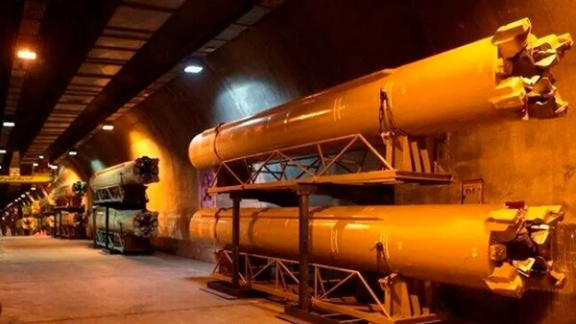
Iran’s Islamic Revolutionary Guard Corps (IRGC) commander-in-chief said that the force’s missile systems "can hit any enemy target in the region and overcome enemy anti-missiles" as the country rebuilds its defences after Israel's October aerial barrage.
Hossein Salami told Tasnim News Agency Monday: “The IRGC today is much more advanced in the field of weapons and much more experienced in skills.”
He described Iran’s military strength as a key factor in deterring adversaries, pointing to past missile strikes as proof of the IRGC’s capabilities.
The comments come just months after an aerial attack from Israel severely damaged Iranian military infrastructure.
The Institute for the Study of War said of the October strike: "The IDF [Israeli military" conducted precision strikes targeting around 20 locations across Iran, including facilities tied to the Iranian drone and missile programs and air defense network."
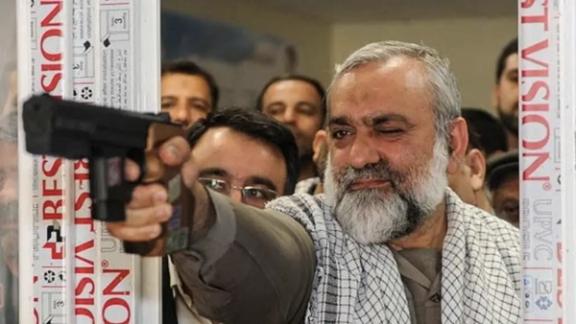
In a separate interview, Mohammad Reza Naqdi, a deputy commander of the IRGC, told state television Sunday: “Whenever we want, we can put any point in the world under the missile range."
The statements come as Israeli Prime Minister Benjamin Netanyahu announced on Sunday that his Monday meeting with US President Donald Trump will include talks on the ongoing threat from Iran.
Reza Naqdi added: “Any range, in any point in the world, that the system and the Supreme Leader wants, is not beyond the technological reach of the Islamic Republic’s military forces.”
Salami highlighted the importance of the IRGC's navy in Iran's defense systems after the IRGC Navy unveiled another underground missile base in the coastal areas of southern Iran on Saturday.
The IRGC also unveiled a new cruise missile, named Ghadr-380, which has "anti-jamming capabilities" and a range of more than 1,000 km (more than 600 miles), according to IRGC Navy Commander Alireza Tangsiri.
Iranian President Masoud Pezeshkian framed Iran’s ballistic missile and space launch programs as defensive rather than offensive on Sunday.
“We have worked to continuously strengthen our defense capabilities with the efforts of dedicated, innovative young scientists,” he said at a military exhibition.
“This development will continue, and dear Iran will join the ranks of countries conducting extraterrestrial flights, showcasing our nation's scientific strength.”
Iran has developed an estimated arsenal of 3,000 ballistic missiles, according to US intelligence assessments.
Iran launched hundreds of drones, rockets and ballistic missiles at Israel last year, demonstrating its ability to strike its archenemy despite extensive missile defenses.
Iranian hardliners have warned that a return to diplomatic negotiations under Donald Trump could include renewed efforts to curb Iran’s missile program.
Tehran has repeatedly ruled out missile-related talks, maintaining that its military strategy is non-negotiable.

A former British soldier who escaped from custody while facing charges of gathering sensitive information for individuals linked to Iran’s IRGC was sentenced to 14 years and three months in prison at Woolwich Crown Court in London on Monday.
Daniel Khalife received six years for breaching the Official Secrets Act, six years for a terrorism offense, and two years and three months for escaping from prison, with the sentences to be served consecutively.
Khalife, 23, joined the British Army in 2018 and served with the Royal Corps of Signals. While enlisted, he "exposed military personnel to serious harm" by gathering and passing on sensitive information to Iran.
The judge said Khalife "took payment on two occasions and traveled to meet intelligence officers from Iran in Turkey." She noted that he "recorded a great deal of information," including the full names of fellow soldiers, and was "driven firmly to the conclusion that this was to send to the Iranians."
Khalife, who escaped from Wandsworth Prison in September 2023 but was caught days later, passed information to Iranian agents for cash and told handlers he would stay in the military for more than 25 years to serve them.
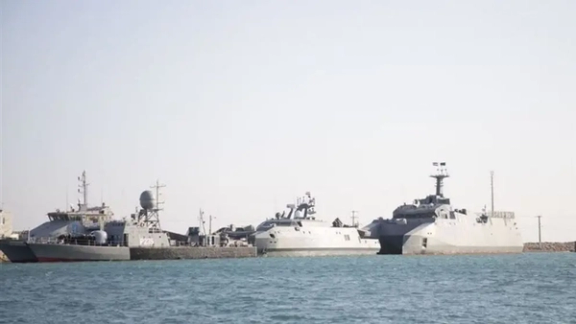
Iran has dispatched four vessels from its IRGC and army navies to the UAE for a meeting with Emirati naval forces.
"We have repeatedly said that regional countries can ensure the region's security and that there is no need for foreign presence," IRGC navy chief Alireza Tangsiri was quoted as saying by state media.
In addition to Persian Gulf forces, coalition forces including the US, Iran's archenemy, have a strong presence around the Strait of Hormuz.
The UAE and Iran repaired diplomatic ties in 2022, abou six years after Abu Dhabi cut diplomatic relations in allegiance with Saudi Arabia after the 2016 looting of the Saudi embassy in Tehran. Saudi followed one year later.
The IRGC navy chief announced there will be ongoing drills with other countries neighboring Iran such as Oman, which was one of the mediators involved in the repairing of ties between Iran and Saudi Arabia.
"We have had engagements with Oman's navy in this regard and have participated in joint drills with Oman," he said.
A multi-purpose drone carrier will also be integrated into the IRGC navy, he said.
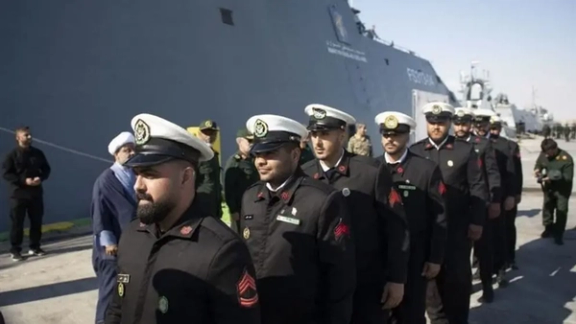

Kamal Kharrazi, a senior foreign policy advisor to Iran's Supreme Leader, expressed concern about what he called Israel's presence in Azerbaijan Republic, which borders Iran to the northwest.
"Countries should take their neighbors' sensitivities into consideration," Kharrazi said during a Sunday meeting with the Azeri presidential assistant Hikmet Hajiyev in Tehran.

Last month, Azerbaijani President Ilham Aliyev condemned remarks by Iranian cleric Seyyed Hassan Ameli, the Friday Prayer Leader of Ardabil who accused Azerbaijan of collaborating with Israel and described President Aliyev's policies as part of a "multi-billion-dollar gamble with the Israelis."
Tehran has long been critical of Baku’s close ties with Israel, while Azerbaijan has expressed frustration over Tehran’s alleged provocations, including inflammatory rhetoric by Iranian clerics and media.
On January 25, Azerbaijan’s Ministry of Foreign Affairs summoned the chargé d'affaires at Iran's Embassy in Baku to lodge a protest over alleged anti-Azerbaijan content in Iranian media.
Tensions further escalated earlier in January after Azerbaijan’s security services said they had foiled a plot to assassinate a prominent local Jewish figure for $200,000.
Two suspects were arrested, with Azerbaijani officials alleging they acted "under the guidance of a foreign country." While no nation was explicitly named, sources within Azerbaijan’s Jewish community have pointed to Iran.
Also in December, an Iranian lawmaker has accused the United States, Israel, and Azerbaijan of orchestrating the helicopter crash that claimed the life of former President Ebrahim Raisi, rejecting the official explanation of a weather-related malfunction as implausible.
Iranian officials have also been occasionally accusing Azerbaijan of allowing Israel to set up intelligence and military bases on its territory as an operational base against Iran.
However, Azerbaijan's ambassador to Israel Mukhtar Mammadov said in 2023 his country would not let Israel’s military to use Azerbaijan as a base for a possible attack against Iran.
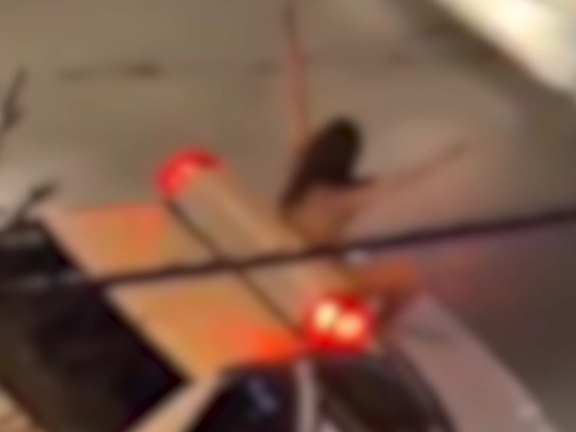
A video circulating on social media shows a woman standing naked on a police vehicle in Iran in the latest instance of a woman disrobing in public and dramatically flouting the Islamic Republic's dress strictures.
The exact time and location of the footage are unclear, but social media users say it has been recorded in the religious city of Mashhad within the past two weeks.
The new video is circulating three months after a similar incident at Tehran's Islamic Azad University, where a female Iranian student stripped to her underwear in protest after reportedly being assaulted by security forces.
During the student's arrest, Ahoo Daryaei was subjected to severe physical assault, including her head striking either a car door or a pillar, which caused heavy bleeding. “Blood stains from the student were reportedly seen on the car’s tires,” the report noted.
Since the emergence of the Woman, Life, Freedom movement in Iran, sparked by the death of Mahsa Amini in September 2022 while in police custody over hijab violations, hardliners have intensified efforts to enforce strict dress codes for women.
Despite widespread public defiance, government measures to reinforce mandatory hijab laws have escalated, resulting in the closure of businesses and the impoundment of vehicles associated with hijab offenses.